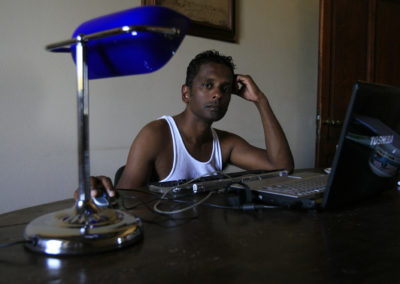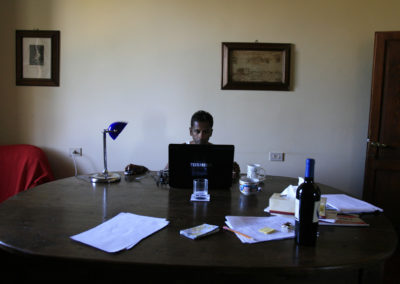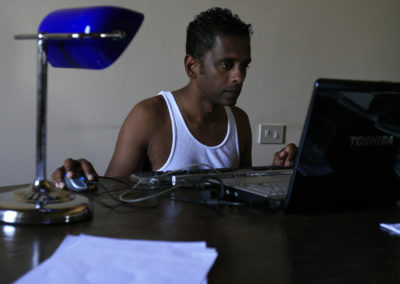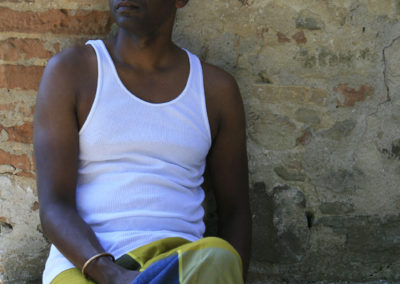This fellowship at Civitella Ranieri provided me with a chance to talk to artists in other disciplines and find out how they worked- to find out what inspired them, how the idea for a work was born, and then how they subjected that inspiration or idea to the rigour of their discipline. I was surprised to find that the process of creation for a composer or a visual artist or a poet was really, in the end, not that different from mine, as a fiction writer. Knowing this gave me more confidence in myself as an artist.
Excerpt from The Hungry Ghosts:
What I am thinking of now is one of the Buddhist stories my grandmother told me called The Thieving Hawk. In it, a hawk steals a piece of meat from a butcher and rises triumphant into the sky. Soon, however, other hawks surround him and try to get the piece of meat away, tearing at the thieving hawk with their beaks and claws. He tries to fly away but the others follow, attacking him as he tries various ways to escape them. Though the hawk is bloodied and wounded, he still holds on to the meat refusing to give it up. Finally, however, the pain is too great and he lets the meat fall. The other birds swoop down to grab it and begin fighting over the meat. The thieving hawk flies away, bloodied, broken and starving, but free of the thing that caused him suffering.
That is how I think of my mother in the days after my father died, seated in a plastic chair, her head tilted towards the morning sun, her waist length hair loose about her, exhausted but at peace. When my sister and I spoke to her now, she was mild and gentle, touching our faces and arms, no longer cruel and shooing us away. She began to do things she had never done before, such as bathe us, feed us with her hand and read to us in the evenings. In the middle of the night, I would often feel my bed give as she got in and held me to her, stroking my limbs and hair before she got up to repeat this affection with my sister.
My parents’ marriage had been stormy and, during my father’s life, there was hardly a night my sister and I did not fall asleep without the sound of their fierce whispering in the living room or outside on the verandah, my mother crying bitterly, my father pleading humbly. Sometimes, my mother would not be able to contain her anger and she would yell at my father, calling him a “ponnaya,” a faggot, railing at his weakness and incompetence.
When they first met, my father had been a junior executive in a prestigious shipping company, but soon his ineptitude began to affect the company and, when he lost a major Japanese client, he was fired. Over the next few years, my parents, my sister and I moved continuously as my father’s bungling cost him job after job. With each sacking, he fell to a lower level of employment until finally, by the time I was 6 years old and my sister 8, he had sunk to manager of a little rest house in Wellawaya. It was a run down place with light green walls that had not been painted in years and dusty shabby furniture that smelt of damp and mould. The seven bedrooms had toilets that were particularly awful, with cracked cisterns and leaking rusty taps, the walls dark with fungi. An open drain carried water and sewage from the toilets to an underground cess pit.
It was not long after we moved to the guest house that my sister and I realized we had a grandmother. A kindly stranger, who we would later know as Sunil Maama, who was my mother’s cousin, started to visit my mother, coming once a month and always bringing my sister and I a box of Kandos Chocolates. My mother was imperious with him, speaking tersely, even crossly, as if she was doing him a favour by tolerating this visit. At the end, he would always give her an envelope of money and, each time, my mother would demand, “Is this her money?”
“No, no, Hema,” Sunil Maama would say with an anxious smile. “It is mine.”
“Well,” my mother would say, even as she opened the envelope and counted the notes, “if it is hers I don’t want it.”
After this had happened a few times, my sister and I wanted to know who “her” was. “Your grandmother, who else,” my mother replied rudely.
“We have an Aachi?” my sister asked incredulously.
“Yes, of course, did you think I was born in a rubbish bin?”
“But why haven’t we met this Aachi?” I asked.
“Because,” my mother said, “she hates you.”
We stared at her dumbfounded.
“Why?” Renu finally demanded.
“Because you are half Tamil. Your grandmother did not want me to marry your father because he was Tamil. And now that you are half Tamil, she hates you.” My mother said this in a way that would tolerate no more questions.
We were not really surprised that someone hated us for being Tamil. For, by the early 1970’s, the tension between the majority Sinhalese and the minority Tamils was escalating, particularly around the latter’s desire for a separate state. My father was resented by the waiters and other workers in the hotel who were all Sinhalese, and he had a hard time maintaining discipline. Though they were kind to us, at the same time they felt no compunction referring to our father as a “Tamil dog” in our earshot.
Our father died of a heart attack, keeling over with a surprised shout one morning while doing the accounts in his office. We barely knew him and so his death left little impact on us. He was gone in the morning before we awoke and came back when we were asleep. Occasionally, he had tried to do something fatherly like take us into town to see a visiting circus troupe, but he was so awkward and humble, so begging of our affection, that we felt stifled by him and were always glad to return to the rudeness of our mother. We saw that, by losing our father, we had got this new, gentle mother, and we gladly exchanged him to death for the person she had become.



